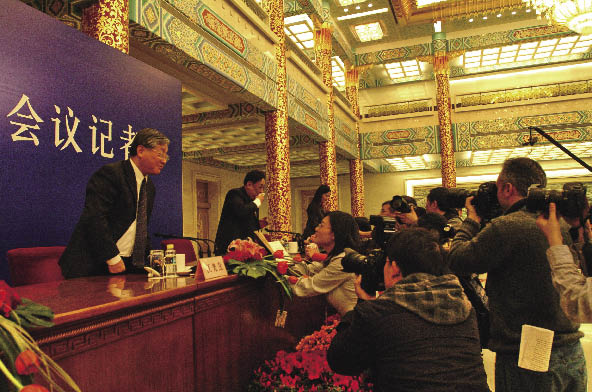| China's Monocameral System Opens Up
By staff reporters LI WUZHOU & ZHANG XUEYING
DEMOCRACY is a topic often mentioned when certain Western people talk about China. China has chosen to practice a form of democracy that is different from that in Western countries. As early as in 1987 Deng Xiaoping said, "In the West, democracy means separation of the three powers and multi-party elections. We have no objection to their doing so, but in the Chinese mainland we don't practice multi-party elections, separate the three powers, or use a bicameral system. We practice the monocameral system – the National People's Congress. This bests suits China's realities."
The Main Functions of the National People's Congress
The National People's Congress (NPC) is the highest organ of state power and exercises the legislative power of the state. When it adjourns, its Standing Committee takes over. The NPC is composed of deputies elected by the provinces, autonomous regions and municipalities under the Central Government, and the armed forces. The NPC is elected for a term of five years. Likewise at local levels, there are provincial, county, city and district people's congresses that handle local legislation.
The main functions of the people's congresses are law-making and supervision, but other functions include electing and deciding on the appointment of important government officials, and examining and approving important matters.
In China, the citizens elect representatives to the people's congresses and through them convey their opinions to the government. People's congresses discuss and integrate people's opinions according to legal procedures, and then form laws and resolutions to reflect the will of the state, or a local jurisdiction. After that, the laws and resolutions are carried out by the governments, courts and procuratorates at relevant levels. In performing their duties, the governments, courts and procuratorates have relative independence, but under the supervision of the people's congresses. In turn, the people supervise the people's congresses in the form of electing their deputies, and they can also dismiss deputies under laws that provide for this action. Thus, a double supervision chain is formed: the people supervise the people's congresses, and the people's congresses supervise the governments, courts and procuratorates, so as to guarantee checks and balances over every level of state power.
According to the stipulations of the Electoral Law of the National People's Congress and Local People's Congresses of the People's Republic of China, deputies to the county congresses or higher shall not be arrested or tried without the approval of the presidium or the standing committee of the people's congress of the same level. Deputies are not held legally liable for their speeches or voting behavior at the meetings of the people's congresses.
Precisely because the people's congresses have powerful functions, the annual session of the National People's Congress in March attracts widespread attention among people from all walks of life. In recent years more and more media journalists are coming to China to cover the annual session of the National People's Congress.
 |
|
On March 10, 2010 Wang Guangtao, chairman of the NPC Environmental and Resources Protection Committee, talks with reporters on energy saving, emission reduction and climate change. Yu Xiangjun |
Testable Achievements
Up to August 27, 2009, a total of 229 national laws had been examined and adopted by the National People's Congress, including the Constitution and related laws, civil and commercial laws, administrative laws, economic laws, social laws, criminal law, and procedural and non-procedural laws. A legal system with Chinese characteristics has taken shape. There are laws to go by for every aspect of life, such as for the economy, politics, culture, and social life, providing powerful legal guarantee for the rule of law.
|
